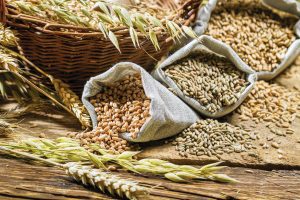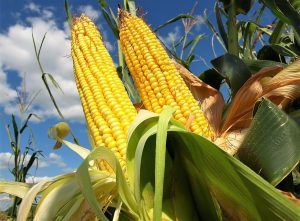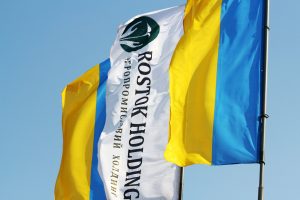Foreign trade turnover by the most important positions in Jan-Oct 2020 (import).


Exports of agricultural food from Ukraine in January-November 2020 decreased 0.3% compared to the same period in 2019, to $20 billion, the Ministry for Development of Economy, Trade and Agriculture said on Tuesday, citing data of the State Statistics Service.
“During the reporting period, Ukraine supplied agricultural food to the EU for the amount of $5.8 billion, or 28.9% of the total export of such products,” Economy Minister Ihor Petrashko said in a statement.
According to the State Statistics Service, in addition to the EU, the largest importers of Ukrainian agri-food products in January-November 2020 were China with $3.1 billion, India with $1.3 billion, Egypt with $1.3 billion and Turkey with $0.9 billion.
Over the period, cereals, oil and meat products were exported most of all. In addition, the supply of sunflower oil, barley, wheat, honey, fruits and nuts, bakery and confectionery products increased, the ministry said.
As previously reported by the Ukrainian Agribusiness Club (UCAB), the export of agricultural food products from Ukraine in 2019 amounted to $22.2 billion, which is 19% more than in 2018. According to its data, over the year the share of agri-food products of total exports from the country amounted to 44%.

The Verkhovna Rada on Thursday adopted bill No. 3087-d on the Bureau of Economic Security – a new central executive body, which activities are coordinated by the Cabinet of Ministers and which is tasked with counteracting economic offenses.
An Interfax-Ukraine correspondent has reported that the document was supported by 242 MPs with the required minimum of 226 votes.
In particular, 201 MPs of the ruling Servant of the People faction, 17 MPs of the Dovira group and 16 MPs of the opposition Holos faction cast their votes for the bill.
“It was a very difficult one and a half years of work. It was a very complicated bill… Thanks to those who interfered. With you, the reform has become more difficult, but richer. Although, of course, the most important thing in the creation of the Bureau of Economic Security is still ahead,” Head of the profile parliamentary committee Danylo Hetmantsev said, commenting on the adoption of the law.
The adoption by the Verkhovna Rada of this document was welcomed by Prime Minister Denys Shmyhal, who called it “a landmark event.”
“Ukraine is taking another step towards Europe and the civilized world. The tax police are becoming a thing of the past, and a new analytical body will appear in its place, which will investigate financial and economic crimes without corruption and masked shows,” the head of government said.
The Ministry of Finance said that the adoption of the law on the creation of a financial investigation body is part of Ukraine’s international obligations, in particular, under the Stand-By Arrangement with the International Monetary Fund (IMF) and EU macro-financial assistance.
The ministry recalled that the document was developed with the aim of eliminating the tax police and creating an independent state law enforcement agency, which is obliged to perform the functions of analytical assessment, prevention, detection, suppression, investigation and disclosure of criminal offenses attributed by law to its jurisdiction.
The new body will unite all the units for combating economic crimes of all law enforcement agencies and will pay more attention to analytical work, which will reduce pressure on business and improve the investment climate in Ukraine.
According to the document posted on the Rada’s website, the Bureau of Economic Security should be created, and the State Fiscal Service should be liquidated within six months after the law enters into force (its publication). It was recommended that the Cabinet of Ministers take measures to form a tender panel to appoint the Director of the Bureau, create this new body and its territorial departments. An open competition for positions in the central office of the Bureau of Economic Security must be held within four months from the date of entry into force of the law.
In addition, an audit of material resources, weapons and special means of the State Fiscal Service of Ukraine should be carried out and they are to be transferred to the Bureau of Economic Security.

The Ukrainian Grain Association (UGA) has agreed to limit the export of corn in the 2020/2021 MY to 24 million tonnes by the end of June in the grain memorandum, since given the association’s export forecasts and the practice of such memorandums, the practical implementation of such a limitation is unlikely.
“The introduction of the maximum corn export volume in the memorandum between the Ministry of Economy and business associations representing participants in the grain market is rather a symbolic step to ensure predictability and tranquility in the grain market,” the UGA said on its website.
The association emphasized the absence of grounds for statements about the likelihood of a shortage of corn on the Ukrainian market. According to its estimates and official statistics, with a harvest of this MY of about 30 million tonnes and internal needs of about 5 million tonnes, exports by mid-January amounted to about 10 million tonnes, of which 2 million tonnes was corn from the previous MY. The UGA also recalled that this year corn exports in mid-January lagged behind last year by almost 3.5 million tonnes.
The association predicts that in the future the rate of export will decrease, as Ukraine has already passed the peak period of export of this crop. The UGA also believes that high prices for corn and benchmarks for its export will give producers a positive signal to expand the area under this crop in 2021.
In addition, the UGA notes that for all the years of the memorandums and the similar restrictions contained in them with respect to wheat, they have never been applied in practice.

Samoran Investments Limited (the British Virgin Islands) of the beneficiary of Nemiroff, Yakiv Hrybov, which owns 49.9% in the Cypriot company Rostok Agroinvest Limited, which owns Rostok-Holding, may increase its stake to a controlling one.
The relevant permission was granted to Samoran by the Antimonopoly Committee of Ukraine on January 21, according to its website.
In addition, the AMCU allowed an as yet unnamed citizen of Ukraine to acquire three Rostok-Holding enterprises through Cyprus-based Zichino Limited: Novhorod-Siversky Elevator LLC, Demor and Novhorod-Siversky Agrarian Investments.
Rostok-Holding is a vertically integrated agro-industrial group specializing in the cultivation and sale of grain crops, the production, processing and sale of dairy products, and grain trading. The group includes three elevator complexes with a storage capacity of 104,000 tonnes and dairy farms in the Chernihiv and Sumy regions with a livestock of about 2,700 animals, including a milking herd of 1,300 animals. The group’s land bank is declared on its website in the amount of about 60,000 hectares

Altis-Construction LLC has won a tender for the purchase by the state-owned enterprise Financing of Infrastructure Projects (FinInPro), a new airfield construction at the international airport of the city of Dnipro, with an offer 30.6% lower than the expected cost.
According to the information on the tender page in the state electronic trading system ProZorro, Altis-Construction offered the final cost of the work in the amount of UAH 3.95 billion, which is 30.6% lower than the expected price (UAH 5.69 billion).
“Finally, the most expensive international tender in the history of airport construction took place, for the choice of the general contractor for the construction of the airfield of Dnipro international airport […] The path to this was not easy, but we coped, despite three rounds of appeals to the Antimonopoly Committee,” Head of State Agency for Infrastructure Projects of Ukraine (Ukrinfraproekt) Kyrylo Khomiakov wrote on his Telegram channel.
He said that seven companies took part in the auction, two of which are foreign (Turkey and Belarus).
According to Khomiakov, the contract with the winner will be signed in accordance with the law on public procurement.
The next step is to start construction work.
It is planned to build a runway with a length of 3.2 km at Dnipro airport. The cost of the project, according to the state examination report is UAH 6.23 billion.
The construction period is about three years.
This year the government has allocated UAH 1.4 billion for the construction of an airfield in Dnipro.